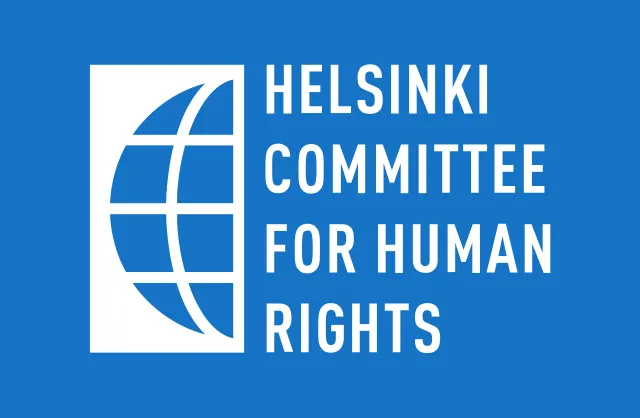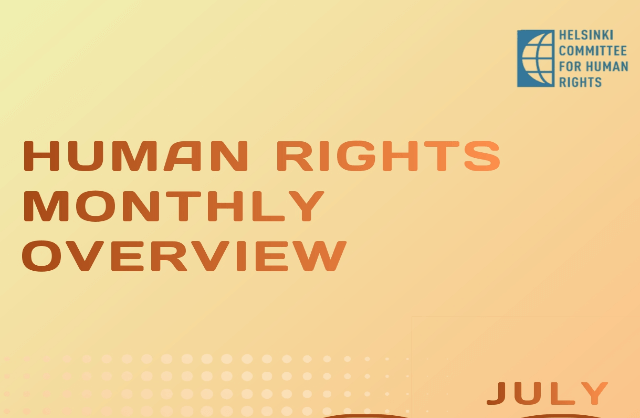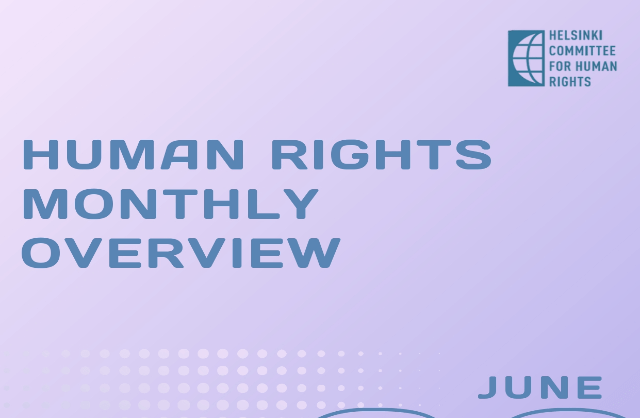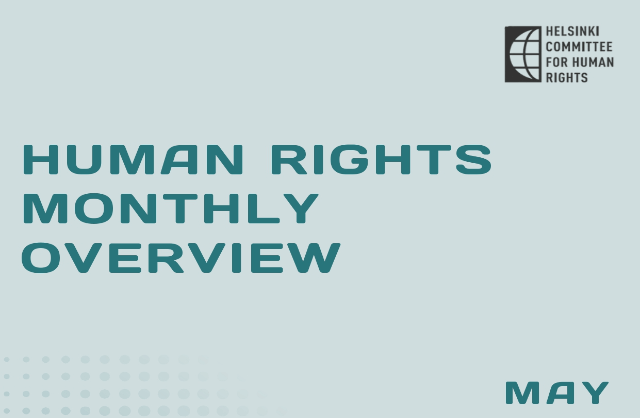Monthly report – May 2016
July 12, 2016

The Monthly report on the human rights situation in the Republic of Macedonia for May 2016 includes the following topics: President Ivanov reversed the decision for abolitions; Protest of convicted persons who serve prison sentences; Commission for Protection against Discrimination (CPD) confirmed discrimination against the blind in the banks of RM; The constitutional Court has not made a decision regarding the issue of discrimination against women in the Labour Law; The Public Prosecutor confirmed discrimination against men in public and private health institutions; Loss of right to welfare.
The monthly report can be downloaded at the following link.
PRESIDENT IVANOV REVERSED THE DECISION FOR ABOLITIONS
On 27.05.2016, President Gjorge Ivanov decided to reverse the decision for abolitions of 22 people, as he claimed, all politically exposed persons. President Ivanov pointed that all the other persons who were pardoned on April 12th, according to legal amendments have the option to submit personal applications for annulment of their pardon. As he noted, the purpose of this decision is to reassure that no politician is above the law. Nor are politicians untouchable. According to the President’s words, everyone will be held accountable for their own actions.
On April 12th, President Gjorge Ivanov announced a collective pardon of 56 suspected perpetrators of crimes for which there are criminal charges and have been initiated criminal proceedings. In reference to the decision made on April 12th to pardon–to grant immunity from prosecution without proceedings, for the greater number of persons in compliance with the Constitution and the Law on Pardons, Ivanov claimed that, at that time same as before, it was made only in the country’s and citizens of Macedonia’s interest. President Ivanov stated that the decision of April 12th was misunderstood as a decision of selective justice and protection of politicians. He pointed out that he truly believed and still believes that the pardon was the best solution for ending the political crisis.
After finding himself under a great pressure from domestic and international public, on June 6th President Ivanov decided to completely withdraw the decision to pardon–to grant immunity from prosecution without proceedings which was made on April 12th.
Recommendation: The Committee applauds this decision by President Ivanov and recommends that in the future he should refrain from taking actions and making decisions that endanger the legal security and rule of law in the Republic of Macedonia and represent an act of breaking the law and a violation of international obligations to protect human rights ratified by the Republic of Macedonia.
PROTEST OF CONVICTED PERSONS WHO SERVE PRISON SENTENCES
Regarding the protest of convicted persons, we would like to inform you about the current situation in the Macedonian penitentiaries and their living conditions. As of April 12th, 2016, the total number of persons placed in one of thirteen closed penitentiaries is 3,446. Of these, 3,159 are convicted persons serving prison sentences and 287 are detainees. The total capacity for convicts is 2,026 persons, which means there is an overcrowding of 156%, i.e. there are 156 persons in premises designed for 100 persons. Most alarming is the situation in the Prison in Strumica, which has a capacity for 62 persons, while 150 persons are placed there–it is 242% overcrowded. The Prison in Tetovo is 200% overcrowded and the prisons in Idrizovo, Stip and Gevgelija are 170% overcrowded.
According to the Department for Execution of Sanctions, the number of convicted persons serving prison from 2010 to 2016 has increased by 46%.
The prisons have sub-standard living conditions. Overcrowding threatens privacy, violates the dignity of people and results in cruel and inhumane living conditions. The supervision mechanisms are dysfunctional. Inmates are often treated inhumanely, which violates the principle of absolute prohibition of torture. The project for Reconstruction of the Penitentiary and Correctional Facilities was to begin in 2011, but to date, apart from the new prison in Kumanovo which is not built according to the standards for an institution of this type, none of the prisons or correctional facilities have been reconstructed as planned. The prison house rules are poorly applied or not applied at all. The convicted persons who contact the Helsinki Committee mostly complain about inadequate health care, overcrowding, inefficiency of the legal aid non-implementation of re-socialization programs, lack of educational programs, poor hygiene, lack of activities, inability to be outdoors for more than 1 hour, limited correspondence, etc.
According to the Committee for Prevention of Torture, in some prison rooms there is an infestation of bugs and various insects, and sleeping mattresses are old and damaged. This international body points to the presence of high level of corruption among prison officials and prisoners. According to the Committee, everything can be bought in the prison–starting from cell phones and drugs to probation and better accommodation in the prison. According to the Committee, prison officials exercise violence in the form of slaps, punches, kicks and body hits with a truncheon. Violence is used as a punishment for having illicit items, as a means of discipline or dealing with violence between prisoners. There has also been noted a racist treatment of Romani prisoners.
The system of complaints from inmates to the prison director, Department for Execution of Sanctions and the courts is completely dysfunctional. The State Commission for supervising the Penitentiary and Correctional institutions regulated by the Law on Execution of Sanctions exists only on paper and does not function. Supervision by judges for execution of sanctions is also non-existent. Besides the Public Prosecutor, whose indications are optional, there are no mechanisms for independent control neither of the prisons nor of the Directorate for Execution of Sanctions. Administration continually refuses to allow non-government organizations and media to visit prisons and talk to inmates.
Recommendation: The Helsinki Committee supports the protest of inmates and appeals for acceleration of activities under the Project for Reconstruction of Penitentiary Institutions. Administrative and judicial supervision must be strengthened. Non-government organizations and the media must be able to freely visit prisons and report on the living conditions.
CPD CONFIRMED DISCRIMINATION AGAINST THE BLIND IN THE BANKS OF RM
The Helsinki Committee, along with members of the Network for Protection Against Discrimination, the National Association of the Blind of the Republic of Macedonia and the National Association of Civilian Disabled Soldiers of Macedonia applauds the positive decision of the Commission for Protection against Discrimination (CPD) which establishes a direct and extended discrimination based on physical disability of the blind by the banks in the Republic of Macedonia.
The complaint was filed on 24.10.2013 against all banks in the country for the purpose of confirming discrimination against this group of people. Unequal treatment refers to the use of banking services and products that require user signature, where banks do not accept the signature of the blind nor do they allow the use of facsimile and they force the blind to authorize a third party who would sign in their name and on their account. Blind people also face problems in using e-banking due to the internal regulations of banks (use of tokens, codes and related security tools that blind people are unable to use). Additionally, banks do not provide the use of assistive technology, such as a Talking ATM, Braille Printer, software solutions for access to electronic services, etc.
For these reasons, CPD recommends that banks do not require a person authorized to act on behalf of the blind and visually impaired and to create conditions for personal signature and facsimile. CPD recommends each bank to make a reasonable adjustment to the specific needs of these people, both in their offices and on the Internet. In terms of control over the operation of banks, CPD recommends that the National Bank of Macedonia, as an institution responsible for supervision of banks’ operations, to strengthen control in achieving equal access to services and products in banks for the blind and the visually impaired.
So far, only Komercijalna Banka AD Skopje has shown willingness to change this unequal treatment, by changing its internal rules and enabling transfer of funds and use of other services, so that the blind and the visually impaired can act autonomously, directly and with assistance by the bank officials, without necessary presence of an authorized person.
For this purpose, the bank has trained employees who already operate in the area of electronic banking, opening of current accounts and opening of bank safe deposit box. Also, so far the bank has trained many blind and visually impaired persons to use the services and products of electronic banking (internet, applications, etc.). The bank adjusted the procedure for using the bank safe deposit box by the blind and visually impaired in a way that now they can open a safe deposit box in the presence of two bank officials.
At the same time, we would like to emphasize that the CPD in this case too failed to make a decision within the legal timeframe of 90 days, which is why we ask them to comply with this deadline in the future and protect the rights of citizens in a timely manner.
Recommendation: We believe it is necessary that other banks change discriminatory practices in the near future following the positive example of Komercijalna Banka, which contributed significantly in overcoming the problems which the blind and visually impaired face.
THE CONSTITUTIONAL COURT HAS NOT MADE A DECISION REGARDING THE ISSUE OF DISCRIMINATION AGAINST WOMEN IN THE LABOUR LAW
The Helsinki Committee has been addressed by a party who is in full time employment in the State Communal Inspectorate as a Workplace Advisor, whose employment was terminated on 30.05.2016, due to turning 64 years of age and at least 15 years of service.
The stipulation of Article 104 of the Labour Law, concerning the extension of the contract of employment up to 67 years of age (for men) or age 65 (for women) with voluntary written statement which can be submitted annually, is discriminatory. Namely, this stipulations gives men an opportunity that women are deprived of, i.e. women cannot extend the contract of employment up to 67 years of age, which is a direct discrimination and denied gender equality. This provision in the Labour Law further increased the gap of gender inequality between men and women, given that women work for a shorter period of time, which in turn results in smaller pensions and contributes to the stereotypical presentation of women as mothers and caregivers, and consequently promotes career advancement of men only.
The Constitutional Court of RM, at the meeting held on 04.01.2015 made a decision registered under U. no. 114/2014-0-0 for initiating a procedure for assessing the constitutionality of Art. 104, paragraph 2 in part: “(men), and 65 years of age (women)” and paragraph 4 in part: “(men) and up to 65 years of age (woman)” of the Labour Law. This decision suspends the enforcement of individual acts or actions based on the provisions of the law pending a final decision. Considering this fact, in addition to the fact that the Constitutional Court has not yet made a decision on the initiated proceedings for assessing the aforementioned provisions of the Labour Act, decisions for termination of employment by force of law are not legally effective at the moment.
Recommendation: The Helsinki Committee believes that the Constitutional Court of the RM must take action as soon as possible and make a final decision that will annul the disputed part of Article 104, paragraph 2 and paragraph 4 of the Labour Law. Annulment of the decision is necessary because women who have retired by force of law, but still want to continue working, will be able to do so. This decision of the Constitutional Court would provide legal security and would remove the discrimination caused by disputed parts of Article 104, paragraph 2 and paragraph 4 of the Labour Law.
THE PUBLIC PROSECUTOR CONFIRMED DISCRIMINATION AGAINST MEN IN PUBLIC AND PRIVATE HEALTH INSTITUTIONS
On 31.12.2015 the Helsinki Committee submitted a complaint to the Public Prosecutor for direct gender discrimination by public and private health institutions against males regarding the inability of men (as parents and caregivers) to accompany children who have be hospitalized in public and private health institutions.
Limited access for men to accompany hospitalized children in public health facilities is a systemic problem with which male parents/guardians are faced. This problem was first actualized in 2011 when the Public Prosecutor reacted publically, alleging that this practice is discrimination on grounds of sex. The Public Prosecutor’s statement referred primarily to the amendments to the Regulations on the content and manner of exercising the rights and obligations of compulsory health insurance, according to which the right to escort the hospitalized child was given only to the mother. Such discriminatory rules in the Regulations were changed and male parents/guardians were given the right to accompany children in case of hospitalization, but these rules have not been applied by public health institutions, i.e. children’s hospital departments.
The answer provided by the Public Prosecutor states that this is sex discrimination. In order to prevent further occurrence of sex discrimination for approving a companion of the hospitalized child, the Public Prosecutor submitted information to the Ministry of Health which recommends that health institutions should take the necessary measures to ensure spacious facilities and hygiene-sanitary conditions in departments in which children can be hospitalized with a companion, and that this right should be equally exercised by the parents or guardians regardless of gender.
Filed complaints are based on telephone testing. A testing of situation is a method used in cases of discrimination when there are missing facts and evidence which are difficult to prove. Test situation involves the use of actors or applicants to detect discrimination on various subjects, processes and areas for different purposes. It is especially important in cases of direct discrimination, which is often hidden behind various excuses and testing of rights already contained in legislation and international standards. Having this in mind, it is particularly significant and praise-worthy the fact that the Public Prosecutor accepts the testing situation as a useful tool for proving discrimination.
Recommendation: The Helsinki Committee appeals to public and private health institutions to take all necessary measures to ensure good conditions in departments where children are hospitalized with a companion and to exercise this right equally for both male and female parents.
LOSS OF RIGHT TO WELFARE
In May 2016 the person with initials ZD addressed the Helsinki Committee for Human Rights and requested legal aid. Namely, on 07.07.2012 the Centre for Social Work of Skopje declared the ex officio termination of social welfare, from 01.06.2012 in the next 12 months and detected an illegal payment from 01.01.2010 to 31.05.2012 on the grounds that the person gave incomplete and false information on the financial situation and condition of the property and property rights and failed to report income from lotteries and other awards in 2010, which according to the regulations for determining the condition of the property income and household property rights does not fall in the category of income. The Ministry of Labour and Social Policy as secondary authority in deciding on the applicant’s appeal, made a decision which dismissed the appeal as unfounded. ZD initiated an administrative dispute before the Administrative Court which made a ruling to annul the decision of the Ministry of Labour and Social Policy and returned the case for retrial, pointing to the illegality of the decision. The Supreme Administrative Court decided on the appeal of the Attorney General of Skopje, confirmed the Administrative Court’s ruling and gave directions for action to the primary authority according to decisions of the Supreme Administrative Court and the Administrative Court. On 09.12.2014, the Center for Social Policy made another decision, disregarding the directions given in the ruling of the Administrative Court and the Supreme Administrative Court. Dissatisfied with the decision by the primary authority, the person filed another appeal which was rejected as unfounded by the Ministry of Labour and Social Policy. Dissatisfied with the decision of 04.12.2015, the person filed a lawsuit at the Administrative Court, which was accepted and the case was resubmitted for consideration. On 15.04.2016 the primary authority made the same decision for the third time, against which the person appealed again.
Recommendation: The Helsinki Committee expresses concern about the unprofessional behavior of the Center for Social Work, especially when they should have in mind that the person is financially challenged, and the financial aid which is granted for the realization of basic existential needs of the person and his family was suspended. The Centre for Social Care and the Ministry of Labour and Social Policy never followed the directions of the Administrative and Supreme Administrative Court and continually delay the proceeding. The Helsinki Committee recommends that the national authorities should be guided by the principle of efficiency and determination of material truth and should act upon the instructions of the Administrative Court and the Supreme Administrative Court.


